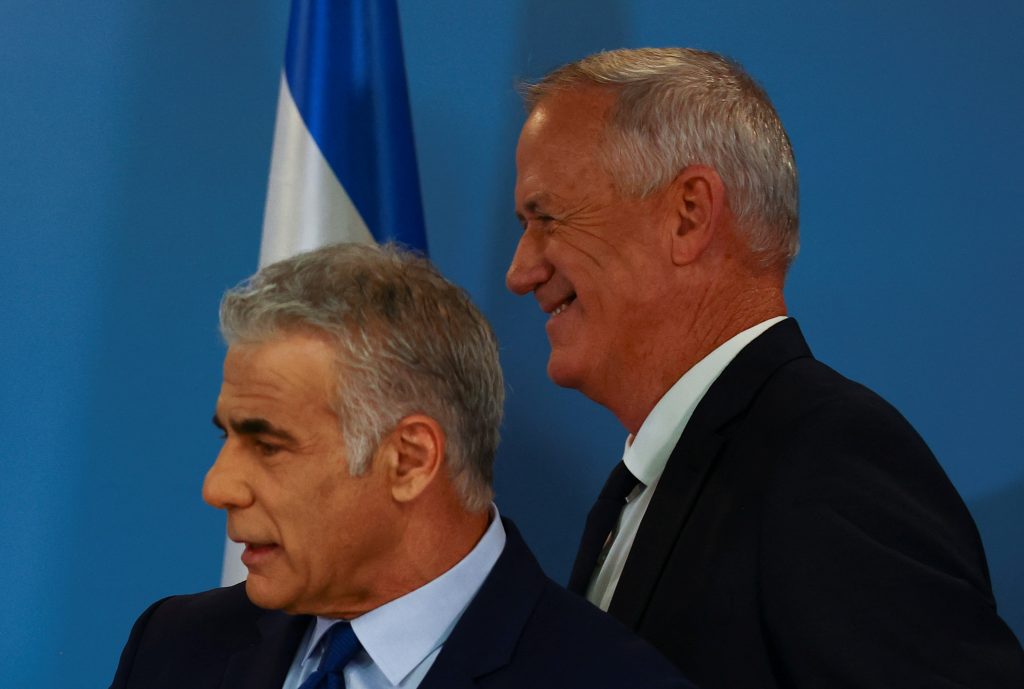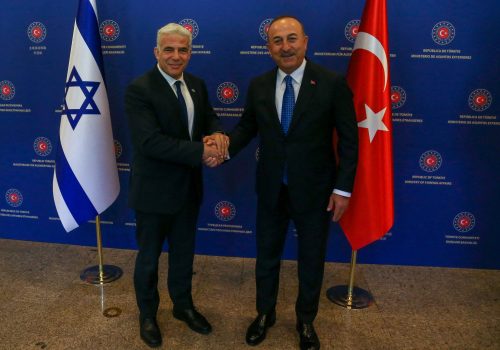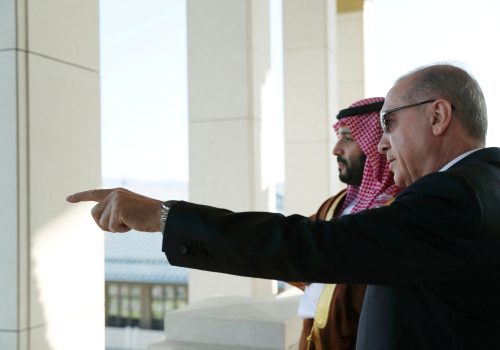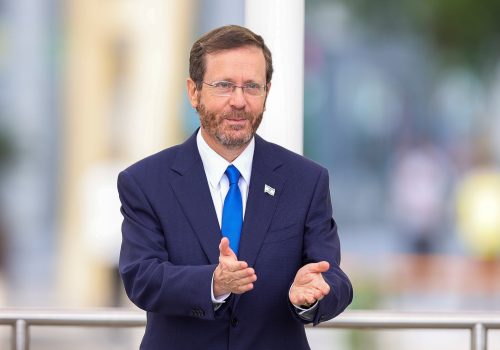The recent visit of Israeli Defense Minister Benny Gantz to Turkey was the latest in a series of firsts after a decade-long period when relations between the two countries had largely broken down.
After the Israeli raid on the Mavi Marmara aid ship going to Gaza in 2010, which resulted in the death of ten Turkish citizens, relations entered a very difficult period and diplomatic relations were severed. Despite the restoration of relations through the mediation of then US President Barack Obama in 2016, the killing of at least sixty Palestinians during protests in the Gaza strip in 2018 led Turkey to withdraw its ambassador from Tel Aviv and expel Israel’s from Ankara.
The normalization process started this year with Israeli President Isaac Herzog’s visit to Turkey in March. Turkish Minister of Foreign Affairs Mevlut Cavusoğlu and the country’s Energy and Natural Resources Minister Fatih Dönmez traveled to Israel in May. Israel’s then Foreign Minister Yair Lapid visited Turkey in June. Turkish President Recep Tayyip Erdoğan met Lapid, by then the prime minister of Israel, in New York in September. That was followed by a visit by Israeli Minister of Economy and Industry Orna Barbivai to Turkey in October. The two countries reappointed their ambassadors and finally, at the end of October, Gantz met both Turkish Defense Minister Hulusi Akar and Erdoğan.
“For over a decade, there were no formal security ties,” Gantz said during his trip, adding that this was changing “in a responsible and gradual process that serves Israel’s interests.”
So what are the short-, middle-, and long-term Israeli security interests that may have brought Gantz to Turkey?
The Syria problem
Let’s start with Hamas and Syria. Hamas’ presence and activity in Turkey are traditionally among the main obstacles to close Turkish-Israeli relations. According to news reports, during his meeting with Erdoğan, Gantz “accused Hamas leaders in Turkey of coordinating and funding terror attacks on the West Bank” and asked the Turkish president to expel them. That itself is now new. During the recent rocky years in bilateral ties, Israeli leaders have previously gone as far as to accuse Turkey of supporting Hamas.
What is new is the normalization of relations between Hamas and the Syrian regime, which is interpreted by many as a reaction to Turkey’s rapprochement with Israel. In September, the group announced the restoration of diplomatic relations with the Syrian government with Iran’s mediation. Nine days before Gantz’s visit to Turkey, a delegation from Hamas paid a visit to Syrian President Bashar al-Assad. This provoked comments on the possibility that Hamas might join the Iran-led “axis of resistance” against Israel together with Syria, Lebanon’s Hezbollah terror group, and Yemen’s Houthi rebels. Since Gantz’s visit there were rumors about the deportation of Hamas leaders from Turkey, but Çavuşoğlu said Tuesday that Turkey had rejected Israel’s request for deportations “because we do not perceive Hamas as a terror group.” We will see in the coming months whether any changes happen in Turkey’s policy regarding Hamas, but if they do, we can expect more defense cooperation between Turkey and Israel.
For Turkey, a resolution between Israelis and Palestinians is of vital importance. According to Akar, Turkey evaluates that enhanced bilateral cooperation and dialogue would also “facilitate the resolution of some issues on which” they have “disagreements, especially on Palestine.” As Gantz said, Israel understands “the need and the support Palestinians would like to get, definitely on the economic and humanitarian issue.”
The impact of the war in Ukarine on the situation in Syria is another major topic of interest for both Israel and Turkey. Throughout the Syrian war, Israel carried out or supported several strikes targeted at Iran’s efforts to strengthen its presence in that country through loyal militias, especially those close to Israel’s northeastern border.
However, Russia’s alleged removal of S-300 missle defense systems from Syria and its overall reduced footprint in the country to concentrate on Ukraine may create space for Iran to increase its influence in Syria.
At the same time, increasing Iranian support to Russia, such as its supply of deadly drones, might push Israel to reconsider its largely neutral stance toward the war in Ukraine. Since the war started, apart from rhetorically standing with Ukraine, the West, and NATO, Israel has refrained from providing military support to Ukraine, fearing damage to its understanding and coordination with Russia in Syria, namely the “so-called deconfliction mechanism” that helps to coordinate Israeli and Russian forces’ operations to prevent overlap and clashes. Now, Israel might be tempted to reconsider that position on providing military support to Ukraine amid increasing public complaints by Ukrainian officials including President Volodymyr Zelenskyy himself.
Preventing smuggling of weaponry from Iran through Syria to Hezbollah is of prime importance for Israel. Gantz reportedly asked Erdoğan to transmit the message to Iran that Israel “will not tolerate the smuggling of weapons through Syria to its proxies in the region, particularly to the Lebanon-based Hezbollah terrorist group.”
Turkey and Iran, meanwhile, have tensions of their own related to Syria and Iraq—where Ankara and Tehran have taken opposing sides in long-running conflicts and battles for influence as they seek to secure their interests in neighboring nations. Another flashpoint is the recently reported alliance in Iraq between Iran’s Revolutionary Guard Corps and the Kurdistan Workers Party (PKK), a US-designated terrorist organization that Turkey has been fighting for the past forty years.
The emergence of potential difficulties between Russia and Israel as well as the risk of increasing Iranian influence in Syria and Iraq necessitate close security cooperation between Israel and Turkey on Syria.
Caucusus cooperation
The Caucusus is another region that could spark potential middle- to long-term Israeli interest in closer relations with Turkey. With the 2020 peace deal that Azerbaijan and Armenia signed following the war over the Nagorno-Karabakh region, Armenia committed to the opening of transportation corridors. The proposed Zangezur project would link Baku to Istanbul, connecting Europe to Central Asia and China through Azerbaijan and Turkey. If this happens, Azerbaijan won’t need to pass through Iran to reach out to Nakchivan, a landlocked enclave separated from the rest of the country.
The route runs along Iran’s border with Armenia. There are serious concerns in Iran that Azerbaijan could use the route to block Iran’s only land opening for trade and transit to the northern Caucasus. Given the close political relations and defense cooperation that both Turkey and Israel enjoy with Azerbaijan, Iran’s worries are hardly surprising.
In fact, the recent clashes between Azerbaijan and Armenia have been interpreted by some observers as representing Azerbaijan’s efforts to pressure Armenia to open this corridor. The European Union decided to deploy up to forty monitoring experts along Armenia’s border with Azerbaijan. On October 17, the Iranian military started a massive drill along its border with Azerbaijan. Meanwhile an Iranian state TV channel recently used a music video to threaten Israel and Azerbaijan with “destruction.”
At the same time, some reports suggest that Azerbaijan helped mediate the Gantz visit to Turkey. Other reports indicate that Azerbaijan might open an embassy in Israel. One can imagine Iran’s alarm at the prospect of being encircled in the north.
This new alignment of interests in the Caucusus could add to the ways in which the Abraham Accords and Turkey’s rapprochement with Israel, the United Arab Emirates, and Saudi Arabia have contributed to balancing Iran in different regions.
Against this backdrop, it is clear that the normalization of Turkish-Israeli relations carries strategic benefits to both nations that are independent of party politics. To be sure, if former Israeli Prime Minister Benjamin Netanyahu succeeds in forming a majority government with the far right’s help—as is widely expected after Israel’s elections on November 1—that might force Turkey to dial down on political dialogue and mutual visits.
However, diplomatic contact in the background over security interests between defense and intelligence officials can continue. Erdoğan underlined as much in a TV interview in early November, stating that Turkey is committed to improving relations with Israel irrespective of who leads the next government, so that the nations can work on their “common interests.” After all, across the region, those interests are only growing.
Pinar Dost is the deputy director of the Atlantic Council IN TURKEY program. Follow her on Twitter @pdosting.
Further reading
Tue, Aug 23, 2022
Washington wins as Turkey and Israel restore normal ties
TURKEYSource By Brenda Shaffer
Turkey and Israel restoring full diplomatic ties is a boon for each country and in the interests of the United States.
Thu, Jul 14, 2022
Time heals all wounds. But will that work with Saudi Arabia and Turkey?
MENASource By Pınar Dost, Jonathan Panikoff
Does time make one forget resentments or do national interests triumph over friendships and enmities? The latter seems true for Turkey's president and Saudi Arabia's Crown Prince.
Wed, Mar 9, 2022
With the Israeli president’s visit, are Israel-Turkey relations back on track?
TURKEYSource By
The Atlantic Council IN TURKEY discusses the significance of Israeli President Isaac Herzog's visit to Turkey, the first state level bilateral visit since 2008 following over a decade of tensions between the two countries.
Image: Israeli Prime Minister Yair Lapid and Israeli Defence Minister Benny Gantz attend a news conference after Israel's cabinet endorsed a U.S.-brokered deal to delineate a maritime border with Lebanon, at the Prime Minister's office in Jerusalem, October 12, 2022. REUTERS/Ronen Zvulun



